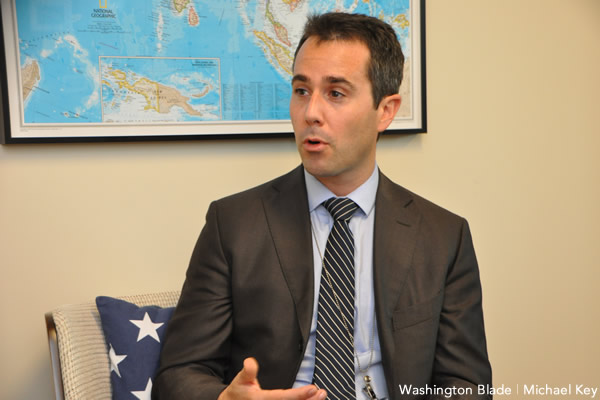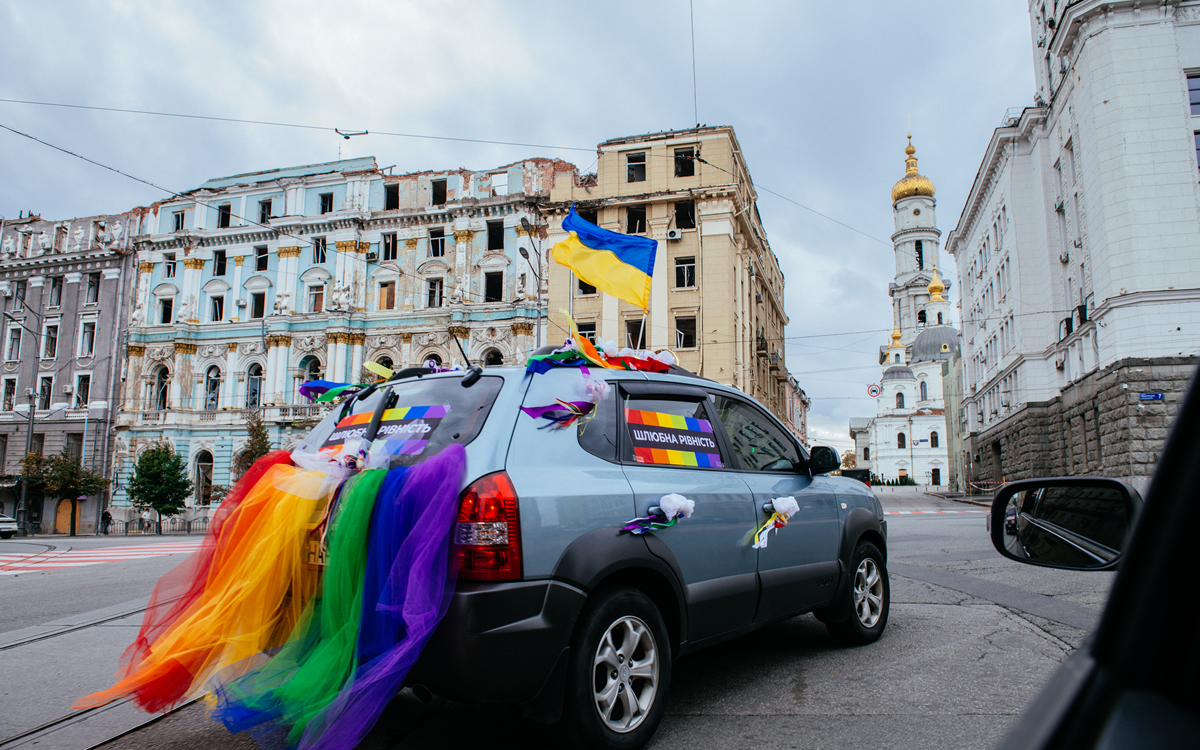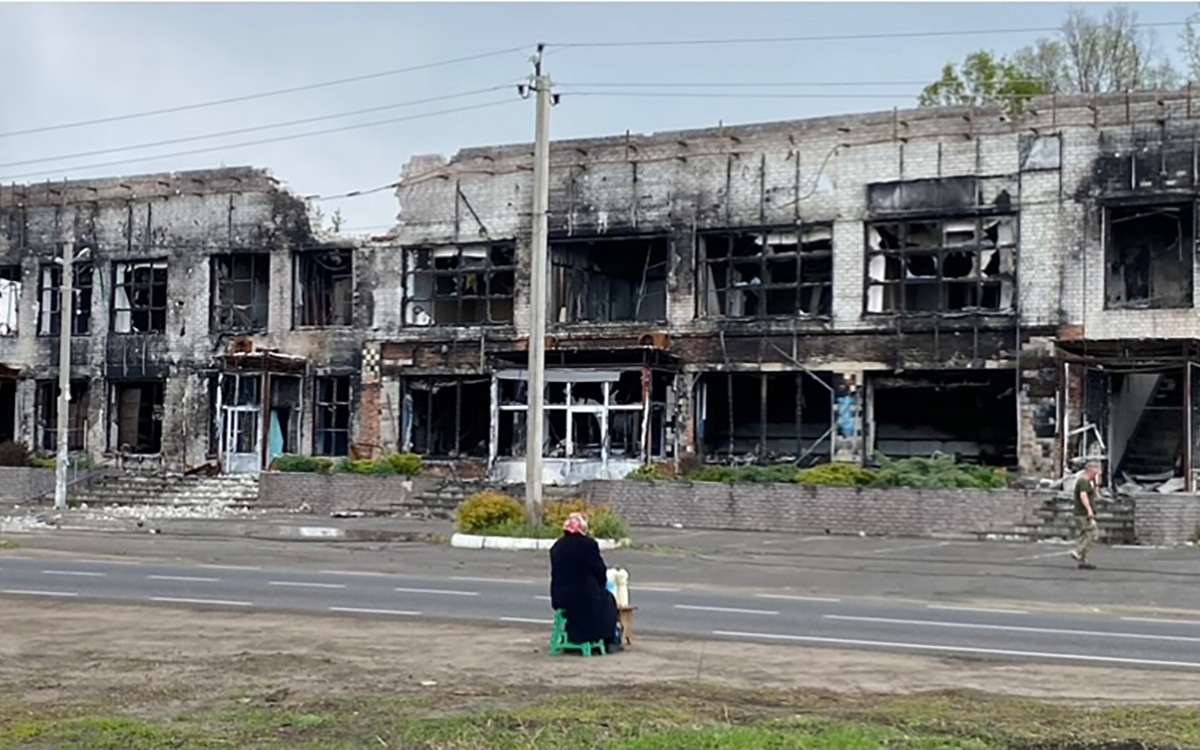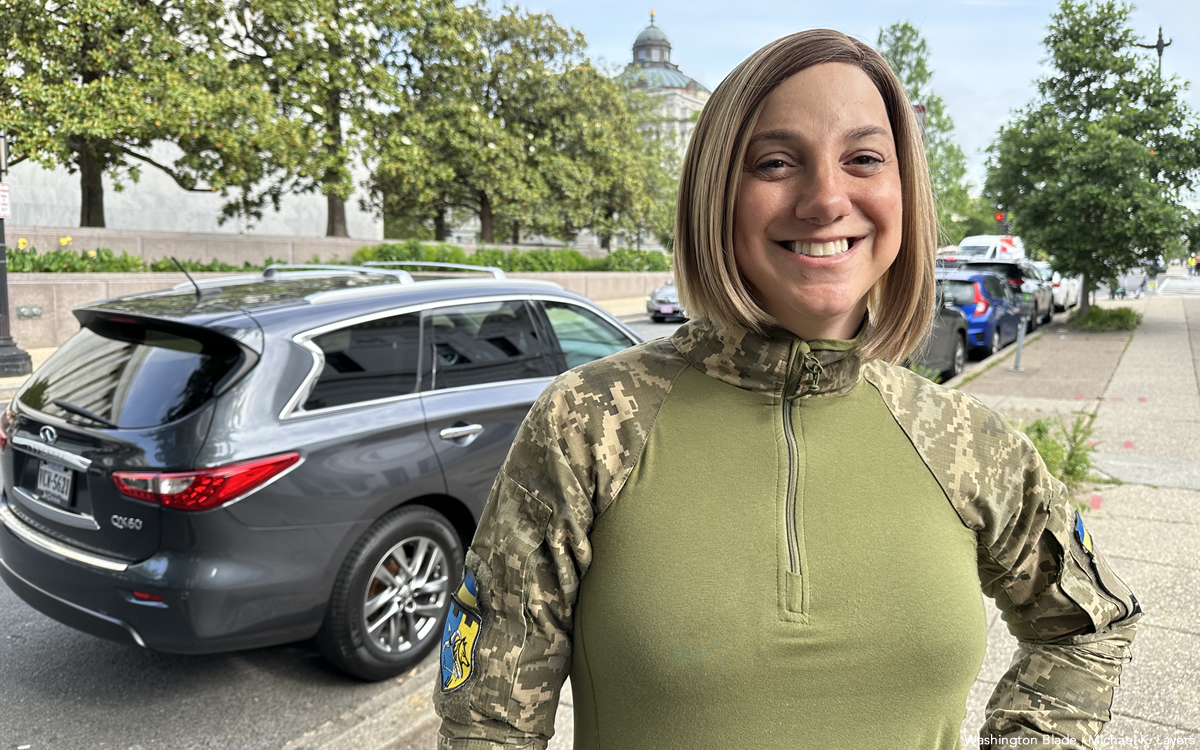Eastern Europe
Former Ambassador Daniel Baer explains it all on Ukraine crisis
Expert downplays strategic thinking behind Putin’s move

Daniel Baer, who worked on LGBTQ human rights and transatlantic issues as one of several openly gay U.S. ambassadors during the Obama administration, answered questions from the Washington Blade on Ukraine as the international crisis continues to unfold.
Topics during the interview, which took place weeks ago on Jan. 27, included Putin’s motivation for Russian incursions, the risk of outright war, predictions for Russia after Putin and how the crisis would affect LGBTQ people in Ukraine.
Baer was deputy assistant Secretary of State for the Bureau of Democracy, Human Rights and Labor and U.S. ambassador to the Organization of Security & Cooperation in Europe.
The full interview follows:
Washington Blade: What’s your level of engagement with this affair? Are you doing any consulting work? Is the administration reaching out to you at all?
Daniel Baer: I actually think the White House is doing a pretty good job of recognizing that they need to not only have press conferences, but also talk to other people who are trying to figure out how to be constructive critics, idea generators from the outside.
Blade: OK, so you’re being solicited and engaging on this issue. My next question for you is why do you think Putin is doing this at this time?
Baer: So, I guess taking a step back from the whole thing, one of the things about a problem like this is that everybody is searching for the right answer assuming that there is a like comfortable or compelling or intellectually accurate answer, and I actually think we’re just in a really hard moment.
I don’t know why he’s doing it now. And in fact, I think that one of the puzzles that we haven’t solved yet is that all the things that he says are the reasons that he’s doing it — that he feels encirclement by NATO, … or that the situation in Ukraine is untenable — none of those things have changed. Setting aside the fact that they’re spurious, it’s not like there’s been some new move in the last 12 months that has precipitated [a reaction] on any of those fronts that you can say, “Oh, well, he’s responding to the recent meeting where Ukraine was offered membership in NATO, or he’s responding to a change in government in Ukraine that it’s clearly anti-Russia, or any other move that we’ve done.” The explanation just doesn’t hold water, and so I think we need to look for alternative ones.
The best I can come up with is actually just a broad — it doesn’t actually explain this particular moment, but I think you could look at the timing of his life. He has, I don’t know, 10 years left. And during those 10 years, it’s unlikely that Russia is going to grow more powerful; it’s much more likely that it’s going to become at least relatively and probably nominally less powerful. And so, if you’re unhappy with the status quo, and you feel like you’re a declining power, and you don’t have endless time, there’s no time like the present. And you’ll make up whatever reasons you need to in order to justify it.
I also think there’s a tendency on our part to attribute far more “strategery” to Putin than there necessarily is. I mean, he’s a bully and a thug. I think the whole Putin’s playing chess and we’re playing checkers is actually completely inverted. We’re in our own heads that there’s some kind of nuanced position that would mollify him. He’s just a gangster and he’s taking a punch because he has one. And I don’t think it gets much more complicated than that. And so, I guess the answer to why he’s doing this now, because the international conditions are such that he feels like the United States is focused domestically, the Ukrainians are not moving forward with succeeding to build — they’re kind of in stasis on building a European state— and he has, you know, he has the space to take a punch, so he’s contemplating doing it, or he’s already decided to do it. And he’s just extracting as much as possible before he takes it.
Blade: That leads me to my next question: What is your judgement of the risk of out and out war?
Baer: I don’t know because I have two hypotheses that cut both ways. One is that I think Putin is vastly underestimating the degree of resistance. On the other hand, I think that nothing short of domination is satisfactory. And so, I don’t know. I guess I think there’s a 90 percent chance that he does something, and I think there’s a 75 percent chance that what he does is not an all out invasion or ground invasion, at least not at first, but rather something that is aimed at confusing us. So some sort of hybrid or staged or false flag kind of attack in tandem with a political coup in Kiev, where he works to install a more Russia-loyal leader.
The thing with the ground invasion is that Russian soldiers’ moms are one of the only, like, powerful political forces in civil society in Russia. I just don’t see any way that a ground invasion doesn’t involve massive Russian casualties, even if they will be dominant. The people who are going to impose the consequences on him will be the Ukrainians, not the rest of us, and he should not invade, and if he does, we should, frankly, work hard to make it as painful and difficult for him as possible.
Blade: What will that look like?
Baer: I think we should at that point continue — we shouldn’t pause, we should continue to send the defensive equipment and backfill as much as possible their ability from an equipment basis to resist.
Blade: So if we were to look at a model for past U.S. engagements. I’m thinking Greece under President Truman, which was so successful that nobody really knows about it, I don’t think. Is there any model we should be looking toward, or not looking toward?
Baer: No, I guess. I’m not sure there’s any good historical model because obviously, any of them you can pick apart. I do think that one thing that has gotten lost in a lot of the analysis — and this goes back to Putin being a gangster thug, and not being such a genius — is there’s a moral difference between us. The reason why Putin gets to control the dialogue is because he’s willing to do things that we aren’t willing to do — as gangsters are, as hostage-takers are — and so yes, they get to set the terms of what we discussed, because we’re not holding hostages. We’re trying to get hostages released. And the hostage-taker has an upper hand and asymmetry because they are willing to do something that is wrong.
We shouldn’t lose the kind of moral difference there. Nor should we lose sight of the fact that Ukraine is being menaced. And I’m not saying it’s our obligation [to intervene militarily], certainly not our obligation. They aren’t a treaty ally. We have neither a political obligation nor a moral one to necessarily risk our own lives, our own soldiers in defense of Ukraine. But if Ukraine wants to defend themselves, there’s a strong moral case to be made that anything, short of risking our own lives, is something that is morally good. We generally believe that self-defense from lethal threat is a reasonable moral cause and assisting others in defending themselves is too — I think there’s a lot of back and forth that get glossed over whether that’s a provocation or whatever, and I want to say to people stand back, look at this: we’ve got one party that is attacking another. And the question is, does the other have a right to defend itself? Yes. And if they have a right to defend themselves, and they also have a right to have whatever assistance people will offer them in defending themselves.
That doesn’t mean that they get to demand that we show up and fight in the trenches with them, of course, and I don’t think there’s any serious people who are recommending that but it’s a good thing to help them. It’s not like a technical thing. It’s a good thing to help
Blade: Getting into that moral background, one thing I want to ask you was about the significance of what would happen in this concept of democracy versus autocracy. First of all, how much is Ukraine a functional democracy, in the sense that if we’re defending Ukraine, we are defending a democracy, and what signal do you think it would send if that Ukrainian government fell to Russian autocracy?
Baer: I think the institutions of government that the Ukrainian people have are not worthy of the Ukrainian people’s own demonstrated commitment …
They are not worthy of the Ukrainian people’s own demonstrated commitment to the idea of democratic institutions. So the answer is today’s Ukrainian government is a mixed bag and it’s very hard to build, on the rot of a Russian fiefdom, a functioning democracy, so I think it’s a mixed bag. I don’t want to sound like I’m minimizing [the changes], or that they’ve completely bungled an easy project. It was always going to be a hard project, and it was never going to be linear.
But I think that what we’ve seen from the Ukrainian people — by which I mean not Ukrainian people, but people of Ukraine — is that there is a broad part of society that a) does not want to live under a Russian thumb and b) sees its future in kind of European style democracy. And so I think that if there was, there’s no question that the Russian attack would be in part about subjugating the people of Ukraine and forcing them to live under some sort of new Russian satellite. And I think that there’s little space for serious argument that that’s something that the people of the country wish to have.
Blade: But I’m just kind of getting at — you’re kind of minimizing that this is a strategic move by Putin, but if he were to successfully dominant Ukraine it becomes a Russian satellite isn’t that saying like, “Well, ha ha West, you thought the Cold War was over and there’s going to be just be a unipolar world in the future but no, we’re gonna we have this we’re back and we’re gonna create a multipolar world for the future.”
Baer: Yeah, I mean, my answer to the Russians who always raise the multipolar world to me is, “Fine, it’s going to be a multipolar world. What makes you think that Russia is one of the poles?” Poles by definition draw people to them, they are compelling and a pole attracts, magnetically or otherwise, and there is nothing attractive about the model that Russia is pursuing. And if the only way that you can be a pole is by subjugating, to force your neighbors, you are proving that you are not one.
I think the benefits for Russia are far smaller than Putin thinks and I think the consequences for the rest of the world of allowing a violation of international order to go forward are much larger than many people recognize.
Blade: But that was their approach when they were the Soviet Union. They were subjugating the Eastern Bloc through Russian force. They did have, in theory, the concept of their worldview of you know, of socialism, or whatever you want to put it charitably, was going to be the right way to go. Is there really that much of a difference?
Baer: Yeah, however disingenuous it was, they did have an ideology . So you’re right, that was a key distinction. The other thing is that the Soviet Union in relative size — its economy and population etc. — was much larger than Russia is today. And Russia is shrinking, and its economy is less diverse than the Communist one was. I think it’s a delusion to think that they’re going to kind of rebuild an empire, even if yes, because of their willingness to do awful things, they could potentially for a time politically control through violence, their neighbors. I just don’t — in a multipolar world, I don’t see Russia being one of the poles, at least not on its current path.
Blade: How would you evaluate the U.S. diplomatic approach to this issue?
Baer: There’s been very clear over-the-top effort to include the Europeans at every step — meetings with them before each meeting and after each meeting, to force conversations into fora that are more inclusive and stuff like that. And I think that Secretary Blinken is rightly recognizing the need to kind of play a role of kind of keeping everybody on the side while we test whether diplomacy whether there’s anything to do, whether there’s any promise with diplomacy.
I think there’s kind of, sometimes kind of, two camps in U.S. foreign policy circles. One is like: We should give the Russians what they want because it just doesn’t matter that much. War is much worse than anything that we would give them. And another is that we can’t give them an inch and we have to punch them in the face whenever we can. And I think both of those are kind of knee-jerk positions that have become a bit religious for people and neither of them is paying attention to the practical challenge that’s in front of the administration, which is like this guy’s threatening to invade and we need to identify whether there’s any opportunity for a functional off ramp, and that doesn’t mean we do that in a vacuum and ignore the long-term consequences, but our problem is not a religious one, it’s a practical one. And I think they’re doing a pretty good job of threading the needle on that and being not too far forward and not too far back.
Blade: Do you see any significant daylight between the United States and Europe?
Baer: No, I mean, no more than the minimum that is possible. There’s a lot of talk about Germany these days. Look, I think some of the things they say are not particularly helpful, but I don’t actually think that in the long run, if Putin invaded, I don’t think that they would hold up sanctions or anything like that. So I think they’re on our side, even if they’re talking out of both sides, in some cases.
Blade: I am wise to the fact that this is a nuclear power. It might be a little old school, but could escalation get that far?
Baer: There can’t be war. There can’t be war between NATO and Russia. It should be avoided. Obviously, there can be, but it should be avoided.
Blade: How committed do you think President Biden is to protecting Ukraine?
Baer: Reasonably so. I think he’s enough of an old school trans-Atlantist that he understands that this isn’t just about Ukraine.
Blade: I was wondering because he had those comments from his press conference about “minor incursion” and I’m just wondering if you’re reading anything into that or not.
Baer: No, I think that was that was a — I think broadly speaking, everything he says is in line with the kind of view that you would expect. And of course, one sentence can catch [attention]. That wasn’t what he meant. What he meant was that he didn’t want to draw a “red line” that would prejudge policy in response to something short of the most extreme scenario.
I think it is a good caution to not obsess over a single sentence and to look at the broad considered policy statements.
Blade: What do you think if you were looking for developments, like what would you be looking out for is significant in terms of where we are going to be going in the near future? This is one thing to keep an eye out for but is there anything else that you are kind of looking out for in terms of the near future?
Baer: I guess I would look out for whether or not the United States joins meetings of the so-called Normandy Format, which is the France, Germany, Ukraine and Russia grouping, which has so far been unsuccessful, but I think can only be successful as the United States joins it, but the Russians, I think have misgivings with the idea of our joining it.
Blade: I’m not at all familiar with that. What makes this forum particularly so —
Baer: So it was started in the summer in like June of 2015, on the margins of some meeting between Merkel and Hollande. The French and the Germans are very committed to the idea that they might be able to mediate peace between Ukraine and Russia. It was supposed to implement the Minsk Agreement, and it just hasn’t been productive so far. I don’t think that the Russians will do anything — I don’t think the Ukrainians feel comfortable negotiating anything without the Americans at the table. And I don’t think the Russians feel like anything is guaranteed without the Americans at the table. So I just, I’m fine with France and Germany taking the lead, but I think the U.S. has to be there.
And there was a meeting of this group in Paris yesterday, and which the U.S. was supportive of, and so I’m watching to see whether or not the United States gets added in some ad hoc way, whether there are future meetings. I guess the reason I would watch it, if the U.S. were to join future meetings that would signal to me that it’s actually there’s some diplomacy happening there.
That’s meant to be focusing mainly on the existing Russian invasion, the occupation of the Donbas, so that’s not about the threat of the new invasion, but it would be interesting to me if there was forward movement on other parts of Ukraine. The announcement of the American ambassador is one. I think that last week movement of troops into Belarus was a game changer for the U.S., because there are all kinds of new implications if you’re using a third country as your launchpad for war, and so it complicates things and it also looks more serious if you’re starting to deploy to third countries and stuff like that. So I think that was that last week, you noticed a difference in the U.S. tone and tenor in response to that.
So things like that. But in general, like what I would do and I don’t think people always catch this is because there’s a boiling frog aspect to it. There are statements coming out from the White House or State Department. Almost every day on stuff related to this and like last week, there was a noticeable change in the tenor as the U.S. became less, I think more pessimistic about the prospects of diplomacy and those I don’t have anything better to look for in those statements as tea leaves, in terms of what the U.S. assessment is of the prospects of the escalation are, so it’s bad.
Blade: Right. That’s very sobering.
There’s a lot of talk, and I’ve just been seeing some like about in terms of, there’s like comparisons to Afghanistan and making sure that all Americans are able to get out of Ukraine. Is that comparing apples to oranges?
Baer: Yes.
Blade: And could you unpack that a little bit? I mean, I can kind of guess the reasons why. How is that apples to oranges?
Blade: Well, the level of development in Ukraine in terms of infrastructure and transport and stuff like that is not comparable to Afghanistan. I think it would be– if there were a Russian invasion–you would definitely want to, obviously, for safety reasons, it’s not safe to be in a war zone, so you would want people to be able to evacuate and you’d have to plan for that.
A major concern [in Afghanistan] was also that there were tens of thousands, if not hundreds of thousands of locals who had worked for the Americans. The Americans that are in Ukraine are not a departing occupying power. There’s just not the same footprint there — the Americans are in Ukraine or there as business people or young [people working on] democracy assistance or whatever. And it’s just it’s a different context.
Blade: Why do you think the Russians put up with Putin? I mean, this is a country that was a world power and I would think has some economic potential just given its sheer size, first of all, and they do have oil to offer people. So why aren’t the Russians like angry at him for obstructing their participation in the global order as opposed to just putting up with him for years and years and years.
Baer: Successful instrumentalisation of cynicism. The lack of a belief in an alternative will keep you from fighting for it.
Blade: That’s pretty succinct.
Baer: I mean, I don’t think there’s any question that the people of Russia could be better off or different in terms of kitchen table issues, and ease of navigating the world, prospects for their future for their children’s future. The amount of money that Putin has invested into military modernization that Russia can ill afford, while he’s cut pensions and social services and health care. It’s just it’s objectively true that the average Russian person would be better served by a different leader. But he’s done a very good job of effectively selling off the country for profit and persuading people through repression and propaganda that there is no alternative.
Blade: And Putin won’t be around forever. Once he finally goes, is an alternative going to emerge, or will it be the next guy in Putin’s mold?
Baer: I think it’s far from clear that what comes after Putin isn’t worse and bloody. Regimes like this don’t reliably have stable transitions.
Blade: Wow, okay.
Baer: Yeah, we shouldn’t… we should be careful about wishing… wishing for his demise.
Blade: That’s good to know. It’s kind of a frightful note for me to end my questions. But actually before I sign off, there’s one more thing too because I do kind of want to talk about the intersection about your old job in democracy and human rights and then a Venn diagram of that with your experience in Eastern Europe in particular. Do you have a sense of what’s at stake for LGBTQ people in Ukraine or if they’re in more danger right now than they would be otherwise?
Baer: That’s a good question. I mean, my knee jerk reaction is yes. That — as mixed of a picture as Ukraine has been in the last seven years, or eight years — there have been meaningful steps forward, and certainly, in terms of visibility.
I guess, in the sense that Ukraine is better than Russia today, if you’re gay, if Russia is going to occupy or control Ukraine we can expect that it will get worse because it will become more like Russia.
Eastern Europe
LGBTQ Ukrainians bear brunt of psychological toll amid ongoing war
Saturday marks two years since Russia invaded country

As Ukraine weathers Russian missile attacks and endures a harsh winter, the psychological consequences on its LGBTQ community are emerging as a distressing and often overlooked aspect of the conflict.
Recent reports from Human Rights First, based on their visits to the northeastern Ukrainian region of Kharkiv, shed light on the profound emotional impact experienced by LGBTQ individuals amid the sustained Russian aggression.
Saturday marks two years since Russia’s full-scale invasion of Ukraine began. Throughout this time, Human Rights First has sought to bring human rights into the heart of the discussion surrounding the conflict, offering support to human rights defenders, activist organizations, and individuals profoundly affected by the war.
Human Rights First last November initially surveyed Kharkiv to understand how communities were preparing for the harsh winter. Returning last month they found the LGBTQ community faced not only the physical challenges of extreme temperatures but also the hidden harm of severe psychological distress.
Human rights defenders on the forefront were documenting war crimes and supporting marginalized communities, including LGBTQ individuals. They emphasized the critical need for specialized psychological support within this community.
Vasyl Malikov, a key figure in Kharkiv-based LGBTQ NGOs Alliance.Global and Spectrum Women’s Association in Kharkiv, spoke about the increasing requests for psychological assistance and counseling.
Malikov highlighted the urgent need for both psychologists and a more comprehensive education about mental health and trauma issues.
“Some counseling can be done online, and it’s better than nothing, but what’s really needed is face-to-face time with a psychologist. Of course, that’s resource-intensive,” Malikov said, underscoring the unique challenges faced by the LGBTQ community.
Associate Professor Taras Zhvaniia, collaborating with Alliance.Global, shared insights into the growing demand for psychological support within the LGBTQ community. Initially addressing trauma in children, the scope expanded to include adults grappling with anxiety, depression and other emotional challenges related to the ongoing conflict.
Zhvaniia detailed the psychological struggles unique to the LGBTQ community, ranging from anxiety and panic attacks to specific fears such as reluctance to sleep in beds at home, avoiding bomb shelters and apprehension about routine activities during shelling.
Efforts to increase psychological knowledge for the general population are underway, yet the escalating demand for LGBTQ-focused support outpaces available resources. Human rights defenders have proposed measures, including funding for online counseling and visits by foreign psychologists, specifically tailored to address the psychological impact on the LGBTQ community.
The silent struggle faced by the LGBTQ community in Kharkiv and beyond necessitates international attention, according to Human Rights First. The organization added the lack of adequately trained psychologists raises concerns about the unaddressed psychological impact, underscoring the urgency for U.S. officials and the international community to comprehend and respond to the unique challenges faced by LGBTQ individuals in the midst of the ongoing conflict.
Eastern Europe
LGBTQ community in Kharkiv braces for another winter at war
Ukrainian city is 30 miles from Russian border

KHARKIV, Ukraine — Only 30 miles from the Russian border, Kharkiv is Ukraine’s second biggest city and was a key target of Russia’s invasion in February last year, when it was almost encircled.
I have been reporting regularly from Kharkiv since last year’s full-scale invasion, and the city is still often bombed by Russian missiles. United States government officials rarely come here because of the security situation. As temperatures plummet, Russia is targeting Ukraine’s heating infrastructure.
It hopes to make life unbearable for people in Ukraine’s cities and force another wave of mass movement out of Ukraine and into Poland and other European countries.
Attacks on Ukraine’s energy grid have begun, and some communities in the city have been particularly vulnerable since Russia’s invasion last year, and are facing a difficult winter.
Vasyl Malikov of the Kharkiv-based LGBTQI NGOs Alliance.Global and Spectrum Kharkiv has been distributing packages of hygiene goods, food and vouchers for humanitarian aid since last year. He helped to set up a new shelter for LGBTQI people and their relatives in the city.
“There are government shelters, and the authorities say they don’t discriminate against who uses them, but we know from lived experience that these official shelters aren’t always welcoming places for LGBTQI people. They feel vulnerable and are harassed there,” Malikov said. “We thought about setting up a shelter last year, but the situation seemed too uncertain and it wasn’t that easy to find premises, but we have gone ahead now and we can offer accommodation for up to 16 people to stay for up to three months.”
Some of those in the shelter are fleeing areas of conflict on the front lines, others have fled domestic violence, and others have been driven away by families who refuse to accept them. Some people, in Kharkiv for medical appointments, stay for days, others stay for weeks or months.
The shelter is a large apartment that has a kitchen and a large room where workshops and social events are held. It is on a block near a metro station which, Malikov says, is a useful place to run to in case of heavy bombardments.
Crucially, a new generator has arrived, which should heat the shelter during power outages. It’s a dual fuel model that can run on diesel or gas and costs around $2,000.
“This is a safe place for LGBTQI people and their families,” explains Malikov. “We shouldn’t have to set up our own facilities, the authorities should be doing this work, but we have to because they don’t.”
Other NGOs are also filling gaps that local authorities are failing to provide. The NGO Sphere has, since 2006 “been uniting women of Kharkiv, including lesbian and bisexual women.”
Tucked in a small office near the city center, some of Sphere’s activists described how their work has adapted to meet the challenges of the war.
“We’ve been providing aid for those forced to flee their homes because of the war,” says Yevheniia Ilinska, a long-standing member of the organization. “We’ve raised money from abroad — including from LGBTQ+ groups — to distribute basic supplies. We’ve been handing out clothes, including socks, and have provided some to our military.”
Sphere’s activists say that beyond its obvious damage and destruction to the city, the war is causing “a social revolution:” many men are away from their homes fighting in the military, and many family dynamics are changing dramatically.
The activists fear a spike in domestic violence when soldiers return home, a phenomenon witnessed in other countries.
“The full-scale war significantly aggravates some of the problems that existed before, including gender-based domestic and sexual violence, and discrimination at work,” Sphere notes on its website.
The war has also helped change some attitudes towards LGBTQ+ people in Ukraine. Last September, when the dangers from rocket attacks made an open-air parade impossible, Sphere helped organize a successful Pride event in the city’s metro system.
“We dressed wearing national symbols and LGBT flags,” says Ilinska. “And the public reception was very positive.”
The reaction is more evidence of a positive shift since last year’s invasion in public attitudes towards LGBTQ+ people, in part because the community’s contribution to the war effort is increasingly seen and valued. Hopes are high that Ukraine will soon legalize same-sex civic partnerships, and eventually same-sex marriages.
But for now, the cold is an immediate challenge. Sphere is raising funds to offer locals a safe place so that “in the event of rocket attacks and power outages, LGBTQ+ people will be able to stay warm indoors, have a hot drink, take a shower, and do laundry,” says Ilinska.
“We’re constantly adapting our work,” says Ilinska. “Adapting our advocacy and our public events, and our projects on targeting humanitarian aid. Kharkiv is changing and so are we, we have to react to this dramatic crisis, to the invasion, and we’re proving that we and our community can resist,” she said.
For more, see Human Rights First’s new report, Ukraine’s Winter War, written by Maya Fernandez-Powell and myself.
Eastern Europe
Transgender soldier from US named Ukrainian military spokesperson
Sarah Ashton-Cirillo was journalist before she enlisted

The Armed Forces of Ukraine have named a transgender soldier from the U.S. as one of its English-speaking spokespeople.
The Kyiv Post, an English-language newspaper, last week in a tweet noted Sarah Ashton-Cirillo “has become one of the speakers for the Defense Forces.” Deputy Defense Minister Hanna Malyar is among those who praised Ashton-Cirillo.
“Sara informs the English-speaking audience — she objectively covers the events of the Russian-Ukrainian war, debunks Russian fakes and propaganda,” said Malyar, according to the Kyiv Post. “Sarah’s audience reach on Twitter alone was 28.3 million users. So, the enemies get excited on hateful social networks, of course. However, this has only increased Sarah’s audience.”
Ashton-Cirillo was a journalist when she began to cover the Armed Forces of Ukraine’s Kharkiv Defense Forces at the beginning of Russia’s war against the country in 2022. She eventually enlisted, and a commander from the Defense Ministry on Jan. 31, 2023, facilitated her transfer to the unit’s 209th Batallion of the 113th Brigade.
Ashton-Cirillo, who was born in New York, was working as a senior combat medic in a trench near Kreminna in eastern Ukraine on Feb. 23, 2023, when shrapnel from an enemy artillery shell wounded her. Ashton-Cirillo suffered injuries to her right hand and to her face, and her fellow soldiers had to wait seven hours to evacuate her. Ashton-Cirillo eventually received treatment for her injuries in Kharkiv, Ukraine’s second-largest city that is roughly 130 miles northwest of Kreminna.
The Washington Blade spoke with Ashton-Cirillo in May while she was in D.C.
“The big key there was I wasn’t able to take any painkiller by staying in the trench because I was still technically in battle,” she recalled. “Seven hours after my injury, I finally got to a hospital.”
Ashton-Cirillo on Tuesday told the Blade her “new role within the Armed Forces of Ukraine is a position that has been earned due to my performance on the physical and informational battlefields.”
“What this means is that in today’s Ukraine being a part of the LGBTQ community is neither a benefit nor hindrance, but simply an accepted part of whom a person is,” she said. “The vocal support shown by LGBTQ groups in Ukraine, such as Gender Stream, Kyiv Pride and Ukraine Pride, upon news of this taking place, along with the statement of confidence in me issued by the Ukrainian Ministry of Defense and Deputy Defense Minister Hanna Maliar, made me understand that this battle for the country’s liberation is not about tolerance or acceptance for any one group but freedom and liberty for all Ukrainians.”
-

 State Department4 days ago
State Department4 days agoState Department releases annual human rights report
-

 South America2 days ago
South America2 days agoArgentina government dismisses transgender public sector employees
-

 District of Columbia2 days ago
District of Columbia2 days agoCatching up with the asexuals and aromantics of D.C.
-

 Politics4 days ago
Politics4 days agoSmithsonian staff concerned about future of LGBTQ programming amid GOP scrutiny










